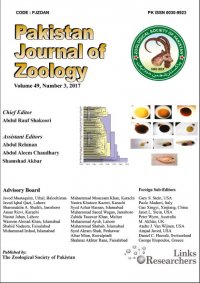Probiotics Supplementation for Improving Growth Performance, Nutrient Digestibility and Hematology of Catla catla Fingerlings Fed Sunflower Meal-Based Diet
Probiotics Supplementation for Improving Growth Performance, Nutrient Digestibility and Hematology of Catla catla Fingerlings Fed Sunflower Meal-Based Diet
Danish Riaz1,2, Syed Makhdoom Hussain2*, Majid Hussain3, Muhammad Zubair-ul-Hassan Arsalan4 and Eman Naeem2
ABSTRACT
The use of probiotics as feed additives has been extensively explored and serves a protective function against gut pathogenic microorganisms. The purpose of this study was to examine the effects of supplementing Catla catla fingerlings fed a diet including sunflower meal (SFM) with probiotics (Protexin®) on growth performance, nutritional digestibility, and hematological indicators. Six test diets and one control diet (0 g/kg) were formulated before the beginning of the experiment, with varying amounts of probiotics (0, 0.5, 1, 1.5, 2, 2.5 and 3 g/kg) added to the basal diet. Fish growth performance, nutritional bioavailability, and hematological indices all improved significantly (p<0.05) after being supplemented with probiotics. Fish fed a diet supplemented with probiotics at a rate of 2.5 g/kg had substantial improvement in body weight (20.29 g), body wt.% (272.78 %), feed conversion ratio (1.24) and specific growth rate (1.46). At a supplementation dosage of 2.5 g/kg, the maximum apparent digestibility coefficients (ADC) were observed for gross energy (73.54 %), crude protein (74.57 %), and crude fat (77.53 %). The total quantity of RBCs, WBCs, platelets, hemoglobin (Hb), and hematocrit (Ht) all changed significantly when fish were given a probiotic dosage of 2.5 g/kg. Incorporating probiotics at a dose of 2.5 g/kg resulted in the best growth performance, highest nutritional digestibility, and best hematological indicators in the fingerlings. Finally, the optimal dosage of probiotics for supplementation was shown to be 2.5 g/kg.
To share on other social networks, click on any share button. What are these?










